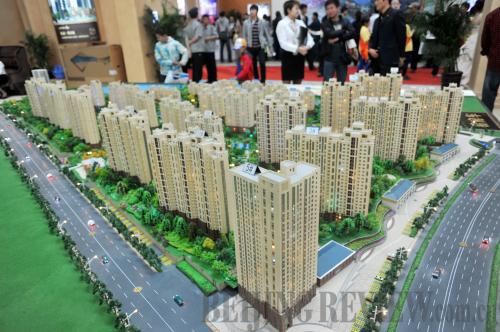|
 |
|
NO PLACE LIKE HOME: Visitors look at a model of a housing project they are interested in at a property exhibition in Yinchuan, capital of Ningxia Hui Autonomous Region, this April (PENG SHAOZHI) |
Housing regulators in Yangzhou in east China's Jiangsu Province announced on May 8 the beginning of an incentive policy for new home buyers.
Jointly issued by local finance and housing bureaus, the announcement said that financial rewards would be offered to people who buy fully furnished houses smaller than 144 square meters from July 1 this year to June 30, 2013. For houses no bigger than 90 square meters, home buyers will receive a reward of 0.6 percent of the total price; for houses between 90 and 120 square meters, the reward will be 0.5 percent of the price; and for houses of 120 to 144 square meters, the reward rate will be 0.4 percent.
The new reward plan applies only to fully furnished houses.
The move will hopefully boost the real estate market in response to soaring property prices.
Beijing began rolling out measures in late 2009 to rein in property speculation, winning nominal success. As a result of the restrictions on housing purchases, China's real estate market has recorded declines in both trading volumes and prices since last year. Not only are property developers plagued by the sluggish market, but local governments have also withstood losses as a result of fewer tax and land leasing revenues.
Several local governments have issued loosening policies, which were usually short-lived. There has been no action taken by the Central Government so far against Yangzhou's easing measures. The Ministry of Housing and Urban-Rural Development stressed the basic realty market control policies would remain unchanged.
During his inspection tour to Wuhan, capital of central China's Hubei Province, from May 18 to 20, Chinese Premier Wen Jiabao asked local authorities to carry out property tightening measures and increase the supply of affordable housing for low-income earners to ensure a healthy property market.
According to the National Bureau of Statistics (NBS), real estate investment, accounting for 13 percent of China's gross domestic product in 2011, rose 9.2 percent in April from a year earlier, the first single-digit rise since November 2009. Newly started construction, an indicator of future supply, fell in April by 14.6 percent from a year earlier, a drop of 4.2 percent compared with that in March.
Sales of commercial housing units fell 11.8 percent year on year to reach 1.24 trillion yuan ($197 billion) in value in the first four months of this year. As the property market remains weak, investment in real estate development in the January-April period increased 18.7 percent from a year ago to 1.58 trillion yuan ($250.79 billion), slowing 4.8 percentage points from the January-March period.
Hao Daming, an analyst with China Minsheng Securities, attributed the single-digit growth in housing investment to ongoing grip on the housing market.
"Home sales have slackened in response to the Central Government's tightened controls, creating mounting inventory pressure for developers. The room for further home price cuts is small and the turnover volume shrink has trapped the housing market," said Hao.
Yangzhou is one of the epicenters of China's sluggish housing market. According to a report by the Yangzhou City Government, the sales area of commercial houses plummeted 30.96 percent year on year to 442,100 square meters in the first four months of this year. By the end of April, the city's commercial house inventory had climbed to 2.87 million square meters, up 35.55 percent year on year.
Yangzhou has seen a slackening of commercial house sales and mounting pressures of inventory since the second half of 2011, said the report.
The sluggish property market has also cast doubts on the outlook of China's fixed asset investment growth, as property accounts for about a fifth of the country's total fixed-asset investment. Official statistics showed that China's industrial production took a sharp dive in April, with the industrial value-added growing at its lowest pace in nearly three years. Fixed asset investment rose 20.2 percent in the first four months, down 0.7 percentage points from the first-quarter growth.
China's industrial value added measures the final output value of industrial production, or the value of gross industrial output minus intermediate input, such as raw materials and labor costs.
"This dip in real estate investment was mainly responsible for a dramatic decrease in industrial value added in April. It shows that the slowdown in housing construction, in response to the government's efforts to control the real estate bubble, also had an impact on other sectors," said Hao.
The depressed housing market stoked expectations that future curbs on the property market may be eased. Although the Ministry of Housing and Urban-Rural Development has been reiterating the government's commitment to bringing housing prices under control, local governments' intermittent easing policies have fueled policy-loosening predictions.
| 